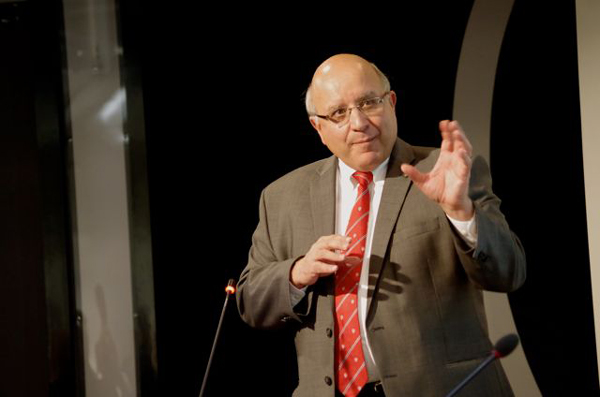
By McGill Reporter Staff
Imposing a hiring freeze for administrative staff at the University will help McGill to keep its promises and meet its obligations with regard to salary increases, while still respecting the provincial government’s demand that universities trim their administrative salary mass, Provost Anthony C. Masi told Open House forums on McGill’s financial situation held Monday.
And although Quebec has made and will make further cuts in university funding, which could push McGill’s operating shortfall to anywhere between $22 million $34 million this this current fiscal year, and has warned that more severe cuts are forecast for the next fiscal year, the University is not yet in a financial crisis, Masi said.
During the morning session held at Thomson Hall, one audience member wondered whether, with various units already at full capacity, the Provost was concerned about the effects of these new cuts on McGill’s ability to continue to thrive.
“I am optimistic,” the Provost said. “But it is time to rethink how we do things, at every level.”
Many also questioned the impact of the 2 per cent cut in salary mass and a 3 per cent cut in administrative operating expenses, mandated by the government in the current fiscal year.
Masi reassured the audience that the University will maintain all its standing salary-increase commitments.
“I am fully aware that while we are asking our staff to take on more responsibilities, we cannot expect them to do more for less,” he said. “But our operating grant is cut – so while we will maintain our salary increases commitments, we will have to find the money elsewhere. This is why it is imperative that we maintain the savings we reached through the VRP (Voluntary Retirement Program) last year.”
When asked how successful McGill was at increasing its operating revenues since last year’s cuts, the Provost responded that the University made good progress on some fronts, such as in generating additional operating revenue from the sales of goods and services. “We have seen a jump in revenues from some of our programs including Continuous Studies, through courses offered by the Desautels School of Management or programs delivered by the Faculty of Medicine,” he indicated. “These are all positive developments, developments we’d like to see more of. In total, increased sales of goods and services generated $11.5 million in extra operating revenue for our University last year.”
McGill had predicted a $10.4-million deficit for fiscal year 2014, which began May 1, 2013, Masi told the afternoon forum. “Instead we saw a $15.7-million surplus” when audited financial statements came in last month. A cash surplus of $3.2 million was automatically applied to reducing the operating deficit, while a $12.5-million change to the market value of the pension plan meant McGill’s pension obligations were reduced for accounting purposes.
In addition, corrections to the Quebec grants to the University resulted in a rare windfall of revenue – part of a complex process of determining how much each student is “worth” for grant purposes according to their programs of study.
But because about three out of every four dollars goes to pay people who work at McGill, the University needs to keep a tight rein on hiring and not let the administrative salary mass rise, Masi warned.
The province has told universities they must have their budgets balanced or be penalized by still more cuts next year, in addition to those already planned.
But McGill is in better shape than most other Quebec universities, Masi noted, having gone through tough budget reductions, including the VRP, last year.
“We took the bad-tasting cough syrup; we did it early. We didn’t borrow against future reinvestment to pay for last year’s cuts. We were responsible in reducing our operating spending. We adapted and the VRP was one of those adaptations. And this leaves McGill in one of the sounder positions in the Quebec university system.”
Masi said the University had budgeted $9 million for special projects, but because the government reinvestment promised last year didn’t come through, McGill will not proceed with those projects for the moment.
There is also some other spending in the budget that might be postponed without affecting the University’s core missions of teaching and research, he said.
“We’re already preparing the fiscal year 2016 budget. We have been much more cautious, we’re trying to be responsible. We don’t know when things will turn around,” Masi said, noting it is better to run deficits when interest rates are low.
“We need to continue to restrict spending, and by January we will take another look at the situation to see if the measures in place will allow us to absorb this year’s entire shortfall and still come within the $7 million annual deficit range allowed by our Board of Governors last April for this current fiscal year,” he said. “But we do know that our primary objectives for FY16 will be to maintain quality.
“We’re going to put a freeze on new searches (hiring from outside). We’re going to have to freeze new positions. We are not restricting reclassifications, but will be asking for a second look at them,” he said.
In addition, the University will stop all non-essential furniture and equipment purchases, and will limit travel and hospitality spending.
In tightening the budget belt will be very hard to avoid having an effect on student services, Masi said in answer to a question at the afternoon forum. “We don’t want it to affect classrooms or graduate funding.
“We continue to be able to attract the best students in Canada. The University is not in a crisis. But we do have to face the fact that we are facing constraints.”
To view the video of the morning Open Forum, go here. The afternoon session can be seen here.
